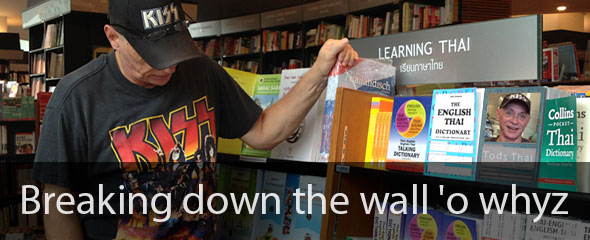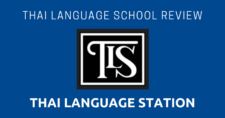
Breaking down the Wall ‘O Whyz…
I had the chance to go out with a group of Thai language teachers from various schools around Bangkok the other nite. We talked about the problems they face when teaching Thai to adult foreigners.
They said a big problem is that foreigners think attending a Thai language school the minimum hours set out by the Ministry of Educations guidelines for a measly four hours a week is going to give them some proficiency in Thai.
Well, sorry to burst your bubble but that just ain’t gonna happen.
I know some students who’ve been attending an un-named Thai language school for several years who are totally incapable of stringing together more than a couple Thai words in even a semi-coherent sentence construct.
Learning Thai is like learning to do anything skillful. It takes time, practice, motivation and desire. Four hours a week just isn’t going to cut it and falls FAR short of the mark. Still, most people know that learning something takes time, so this is a no brainer really as far as learning much of anything to a fair degree.
The next thing (the actual topic of this piece) is this: to a person the teachers said students incessantly ask “WHY?”
Why does the Thai language have 6 characters that make a “T” sound? Why doesn’t Thai space out words like most other languages? Why isn’t Thai more like English? Why does an adjective or adverb go after the main verb? Why does the possessive go after the noun? Why? Why? Why?
The teachers said this is easily the biggest impediment to foreigners learning Thai.
Being an inquisitive person, and with Thai being the first second language I’ve attempted to acquire, I fully admit that I am guilty of asking why questions. It’s quite possible that I’ve asked them hundreds of times in my quest to learn Thai. And I realized that after discovering the answer to my mundane why question via a Thai teacher, Google or some other resource, I didn’t get that much better in Thai.
I sure didn’t speak Thai any clearer. I certainly didn’t learn any faster. I couldn’t read any better. In short, knowing why didn’t help me a single bit in learning Thai.
Looking back at my early attempts, asking why got in the way of my learning way more than it provided any real help. Granted, I did find a lot of interesting things about the “whyz in Thai”. But other than being able to provide answers to other foreigners asking the same questions, it really didn’t help me learn Thai all that much better.
I know in previous pieces I’ve written that it’s important to find a teacher who can explain the “whyz in Thai”. However, now I believe that it’s really not that important of a factor and actually can be an impediment to learning.
Being at a fork in the road on my journey to learn Thai I found myself faced with two choices: either accept it and get on with learning, or stress out about the “whyz” and stumble along at a snails pace. I now accept that Thai is Thai and it’s different from other languages. End of story.
The teachers also said that students seem to build a “wall of whyz” in front of them as they try to learn. Every brick in this wall is composed of a question which starts with the word “WHY”. It’s getting students to break thru (or climb over) this “wall ‘o whyz” which could very well be separating the people who learn Thai from the people who can’t seem to get it to click.
I’m not going to pretend I have the answer to how people can overcome this (I’m certainly not a life coach, or a cunning linguist, lol). And at the end of the dinner the teachers didn’t really come to a consensus either. They were all of the mind that once a student breaks down the “wall ‘o whyz” they learn Thai faster. Sometimes WAY faster. They went on to mention that some students seem to break thru more quickly but others have never managed at all.
Anyway, after this nearly four year quest of mine to learn Thai (which I honestly undertook because I was bored and also because I knew 63+ million Thai speakers weren’t ALL smarter than me) I can say without a doubt that my asking why was possibly the biggest stumbling block at learning this language.
Now, don’t get me wrong. My spoken Thai isn’t anything to write home about. I am a horrific Thai speaker. I speak Thai with a definite Middle American accent. I routinely sub out long for short vowels, mix up the tones, and some of my sentence constructs are so “un-Thai” that it leaves the Thais scratchin’ their heads as far as what I’m on about. However, I only know this because I’ve reached a level of proficiency to realize I speak some pretty shaky Thai. Early on I didn’t know just how bad I sucked at it and that was actually a blessing.
I suggest anyone wanting to undertake this language, take that “WHY” word right out of your vocabulary from the get go. Knowing why won’t help you, it only seems like it does at the time. Accept that Thai is different from your native language. Accept that it’s written like it is and that it ain’t gonna change in our lifetime. If you wanna speak, understand, read and write Thai, the faster you break thru the “wall ‘o whyz” the faster you’ll get there.
Again, these are only my opinions and I realize they may run counter to yours. That doesn’t negate either of our views on the subject, it just shows how different we all are.
I always tell people, I’m not smart so if I can speak, read and write something which resembles Thai enough to interact with the Thais, ANYONE who puts their mind to it can too.
Sincerely good luck in your Thai language endeavors.
BTW: “Wall ‘O Whyz” is a phrase I coined, feel free to use it but remember you heard it here first!!!
Tod Daniels | toddaniels at gmail dot com







As this is my first post here, a few things about me: I am German, still working and living in Germany, but about 70% of the last two years since I first visited Thailand as a tourist (with initially no intent to return more frequently) I did end up spending in Thailand, mostly in Bangkok with my girlfriend.
As I have no work permit here and was bored, I started going to language school for a month, heard about ED visa and decided to try and learn more Thai. I learned for 5 months in 2018 and 3 more months this year (2019) after having worked in Germany for a couple of months. Now I have finished school and am enjoying a few months off before returning to my business in Germany.
I am a lazy person, so I do need a teacher to “kick my butt” in order to actually engage in learning, but while I attended school I took it pretty seriously. Given the amount of time and money invested, I would consider it a huge waste not to get anything back out of these investments. So going to school just because I had to in order to justify my ED visa was *not* my motivation. I really wanted to learn something and I think I did, thanks to the good teachers at Duke Language School.
I would rate my Thai as okay conversationally. I can read fairly well, but am lazy to practice typing or writing, which is my greatest weakness. I can get by in one-to-one conversations, but am still struggling to follow conversations with multiple people involved or to concentrate in noisy environments with many people talking or music playing. Maybe I should start reading books or watching Thai TV. But as I said, I am lazy if I don’t have to do homework for school. So my progress is way slower than it could be if I did in fact practice by myself regularly.
————————————————–
I have not read all comments on this article, but many seem to agree with Tod’s opinion. I choose to disagree. Maybe this is because I am a logic-driven learner and like to not just rote-memorise or condition myself to something but to actually *understand* what I am learning. Understanding means finding answers to “why” questions. My learning experience was that it helped me tremendously to have teachers who could answer my “why” questions and e.g. explain Thai grammar in a systematic way. Whenever teachers failed to do so, I had a hard time to wrap my head around new language structures, tone or grammar rules. Good answers to “why” questions helped me make progress.
A thing you should not do is to ask normal people (who are not trained to teach Thai as a second language) “why” questions. Even my own Thai girlfriend who is a teacher (but for English language) and quite smart regularly fails to answer those questions. Most Thais know very little about grammar and tone rules, they mostly acquired their mother tongue via “learning by doing”. So don’t expect to get a lot of good answers from them. But I do expect a Thai language teacher to be able to explain in a systematic way.
Another example are Thai words. It helped me a lot to look up longer words in my dictionary app and use the “search words inside” function in order to see which shorter words hide within longer ones. In many (not all) cases it helps me memorise and understand longer words by knowing their constituents because I can build cribs or memory anchors.
I do admit than for some “why” questions good answers just do not exist, but I will never give up asking because sometimes I gain valuable insights. In my opinion you cannot master a language if you do not understand the underlying systematics. I can only theorise about whether my asking “why” questions made me faster or slower overall. Maybe I could have broken through the wall of “whys” and learned more quickly. But if you ask me today, I would do it over again like this and bug the hell out of my teachers asking questions.
Great article.
It will help me hone my skill to learn Thai better.
Thanks for sharing Tod.
Why? Because two different cavemen invented language, and it evolved from there, one into English and one into Thai. I’ve decided that’s probably the answer. So forget your preconceptions about what a language should be like, and go with it, however it is.
Tod – government sigs and BTS use different phonetics. ie. Chitlom an Chidlom.
Jaimee;
The reason a LOT of thaiz take “creative license” with the pronunciation of words written in english is; a LOT of thaiz learned to read english words via ‘karaoke’.. By that I mean english words written in thai to approximate the sounds.
The down side is; the second you write a word in thai, it has to follow thai pronunciation rules, there’s no way around that.
FWIW; In karaoke “How are you today?” = เฮา อาร์ ยู ทูเดย์
I do agree the longer you study thai the more “whyz-in-thai” you get answers to.
I think that some of the “whyz” get answered the further on you study. I certainly understand the Thai culture more and why they pronounce certain English words the way they do.
Sometimes you just gotta set the “whyz” aside and press on. Sometimes, it just is.
It could be you missed the mark as far as what I was getting at in terms of asking “Why?” in a Thai class, especially in a group setting. I honestly don’t know how you were able to warp what I wrote into the opening sentence of your post; “In other words the Thai language teachers want their foreign students to be more like Thai students: automatons who learn by rote and never question anything.” Even for me, I think you took some creative license in your interpretation.
The teachers most certainly don’t want the students to be little “auto-bots” in class like Thai kids. In fact most classes I’ve sat the teacher will write questions on the board to be answered during the break between classes, rather than eating up class time. More to the point, most of the meaningless “why” questions I’ve heard asked in classes show the exact opposite of what you purport they mean. It is my experience that the student hasn’t “learned something” or “given it thought”, instead the “why” question is almost a “knee jerk” reaction to something which runs counter to the students mother language, and not a “need for knowledge” which could be applied to the learning of Thai.
There is also no “blame” assigned from the teachers to the students as far as them using their brains to analyze and question what they’ve learned either. Again, that’s a pretty broad brush take on what I wrote.
I find it strange that all the similar sounds were “lumped together” in your head, because I’m totally self taught and yet they didn’t get lumped in that way to me. I can’t even repeat the Thai consonant alphabet in order, as it has no value what so ever to a foreigner. Instead I learned the consonants by class, mid, high, low paired and low stand alones). That sorta split up the similar sounding consonants (a little except for the 3 “S’s” ส, ศ, ษ).
I’ve also sat classes which got dragged so far “off topic” answering inane “Why?” questions that the entire class was derailed. That you have an “inquiring mind” and need answers is great (for you), but don’t believe every other student in your class has the same “need for knowledge” that you do. I’ve seen the difference in progress between students who continually ask why, versus ones who rarely ask and instead just accept Thai is Thai. The one’s who don’t ask make far better progress. I’ll always believe knowing why doesn’t really help a person speak or read Thai better.
Sometimes the answers to the “whyz-in-thai” need to be done on your own after class with the teacher or by using something called the internet and finding it out for yourself.
You sound like a person who would do better taking private lessons rather than in a group setting. Remember in group lessons the needs of the many outweigh the needs of the few. Sorry, that’s just how it is. Don’t shoot the messenger, man, I’m just telling you what I’ve seen all too many times.
Thanx for takin’ time to read my post, even more thanx for responding to it too! It shows you’re motivated in your learning, and that’s all I’m tryin to accomplish with them.
Sincerely, good luck in your learning Thai endeavors.
In other words the Thai language teachers want their foreign students to be more like Thai students: automatons who learn by rote and never question anything.
A student who asks a question is a student who has learned something, who has given it some thought and who wants to know more. Instead of brushing the “whyz” aside, use them as teachable moments.
Has it been explained to me from the get-go why Thai has so many ways of writing the same sound I would have had, early on, a much better understanding of the Thai alphabet, writing system and tone rules. By the time I discovered the answer it was a bit late and all the similar sounding characters were lumped together in my brain as one. It has taken some effort to undo that involuntary bit of rote learning.
Another “why” for which an early answer would have been appreciated concerns the order of the Thai alphabet. Discovering the answer to that “why” was a real “aha” moment for me and instantly made dictionary lookup so much easier.
I understand why teachers are reluctant to deal with the “why” questions. Many of them are difficult to answer. Some simply do not have answers.
But blaming students’ lack of progress on the use of their brains to analyze and question what they have learned seems terribly wrong to me.
I’m sorry if the “whyz” interrupt your lesson plan, but if you’re going to teach a language in a formal classroom setting then you need to be prepared to answer them.
One of Donovan’s latest posts is an interesting read: You Don’t Need To Study Grammar To Learn A Foreign Language.
It used to drive me crazy when I asked WHY (mostly grammar) questions but received obscure mumbles instead of logical explanations. And replies sounding like old wives tales would set my teeth on edge! Then I started poking around Jim’s Thai Reference Grammar and was able to leave my friends in peace. TRG might not be for everyone but the writing style suits me beautifully.
A given, individuals learn languages slightly different from each other. Just look at AUA (love it or hate it). And the different stages of learning a language seem to draw on a variety of skill sets. Some students don’t want to know about grammar in the beginning but later on it becomes interesting.
Here’s one of my fav articles on learning languages: Language Learning in the Real World for Non-beginners
Seems totally logical, yes?
Dan;
Actually there is more than anecdotal evidence to suggest at least in the ESL realm of learning the teaching of “grammar rules” is counter productive to getting people to speak understandable English any faster. There are some studies which have shown learning too many rules slows down a persons ability to formulate sentences fast enough to keep up with what’s being said. However, my post was about learning Thai, and what it ain’t is English. ..
Don’t confuse my premise of stop asking why with the need to know good sentence structure. Know why Thai has 6-“T’s”, 5-“K’s” or 4-“S’s” ain’t gonna get you speakin’ Thai any faster, even if you know they mostly have those characters because Thai is a hodge-podge of Ancient Thai, Pali, Sanskrit, Cambodian, and Chinese and as a rule those characters show word origins. Knowing that ain’t all that much of a help in speaking or learning Thai.
Good Thai sentence structure is something that can be learned and used inductively (seeing or hearing it enough times that you begin to apply the “rule” without ever being taught it). Again, there’s no need to ask why Thai is structured like it is to begin to speak Thai like Thais says things. You just mimic how they say it. You don’t need to know “why” adjectives/adverbs go after nouns or verbs, they just do. You don’t need to know “why” Thais rarely กำลัง in spoken Thai and mostly อยู่, they just do.
These asking “why” moments often get the learner caught up in the minutia of a language rather than facilitate the acquisition and application of it. As I said, I asked “why” so much that even though I know many, many competent teachers of Thai, none would teach me before.
That you took time to read my post and to comment on it shows you’re at least motivated in learning. Disagreeing with what I posted only shows how different people acquire knowledge differently once we’re adults, possess a native language, can ask questions and can use life experience to make leaps in logic as far as learning Thai.
They are two different things but for some – perhaps not for you, but certainly for some since it’s true for me – knowing why a structure works in a certain way adds to the depth of understanding. If you don’t what to know that kind of stuff, that’s fine but it’s patently untrue to say that my time would be better spent not thinking about this. One problem which occurs again and again and again in language classrooms and on language blogs (particularly on language blogs, I suspect) is the idea that there’s one true path to learning a language. There isn’t so if something doesn’t work for you, don’t do it. But you should not conclude that it’s global useless.
@Dan – Knowing something and knowing why something is the way it is are two completely different things. Knowing that possessive follows the noun is obviously important, but knowing why it’s like that and not the other way around isn’t really relevant. Instead of asking why the possessive follows the noun, your time would likely be better spent in just accepting it and possibly asking if this is always the case or if there are exceptions to this rule.
Why does the Thai language have 6 characters that make a “T” sound? Why doesn’t Thai space out words like most other languages? Why isn’t Thai more like English? Why does an adjective or adverb go after the main verb? Why does the possessive go after the noun?
I think two of those questions are directly and immediately relevant to learning Thai, the others perhaps less so though expecting an answer from your teacher on Thai orthography shouldn’t be asking too much (but sadly it often is).
Languages are either predominantly head-first or head-last. What that means is that the head word in a phrase either comes at the start or the end of a phrase. For example a noun phrase can consist of a noun or a noun plus an adjective, a verb phrase could be a verb alone or the verb plus a ton of other stuff, a prepositional phrase is a preposition plus its object, etc. Thai is a head-first language so the order will be noun followed by adjective or preposition followed by object, etc. In some languages (Japanese is, I think, an example) this is reversed. English is generally head-first (like the majority of subject-verb-object languages), though not with regard to noun phrases so English speakers say ‘the white house’ instead of ‘la maison blanche’ or บ้านสีขาว.
That seems like a useful thing to know – knowing that would help you understand the mechanics of word order in Thai, wouldn’t it? Discovering this certainly helped me.
Ooops. Missing word. That should be “I don’t think there’s any sound evidence (emphasis on sound…”
I disagree with most of what’s above, though I understand the AUA injunction against asking question – it makes sense just from the point of view of classroom management.
Asking why may be pointless in theory (lots of things happen just by chance and/or a kind of genetic drift in language) and it’s often pointless in practice (language teachers, Thai, English and no doubt all the others) are often woefully uneducated about their subject, but I don’t agree that it doesn’t help. To take an example from English, if you’re learning why -ed endings change from /d/ to /t/, many TEFLers will say “Don’t ask why. That’s just English. We’re quirky and amazing.” (I’ve seen them do it) but there is an answer and it’s to do with voicing but, unfortunately, most people who teach English don’t know these things. They think it’s an inexplicable oddity of language but it isn’t and I’m sure this happens at least as often with Thai teachers.
There’s also a huge individual variation in these types of things and as soon as anyone says “If you’re learning a language you must/mustn’t..”, unless it’s utterly trivial, the statement is almost certainly wrong. What should you do? That depends on you. Some people learn best by getting to rules from examples whereas others work best by understanding rules and using those to generate specific instances. For those of us in the latter group, asking why is pretty important but there’s no ‘right’ or ‘wrong’ in being in either group. And I don’t think there’s any sound (emphasis on sound, not anecdotal reports from teachers, which can be explained in any number of ways) to suggest that having either learning style leads to more rapid acquisition.
And (there’s more to say but this will do), learning a language isn’t just a matter of mastering a grammatical or lexical set (at least for me it’s not). It’s about intellectual inquiry and scratching an itch of curiosity. Sadly, we increasingly see everything in the world as purely instrumental – things have value only in as far as they are tools to get things done. That’s a seriously impoverished view of the world in general and of language learning in particular.
I came to the same conclusion as you a long time ago. I use to be caught up in the whys, until I just stopped myself and said, it is the way it is. Of course there are still some why questions that you can ask that are not a waste of time. These generally revolve around my understanding of Thai grammar and pronunciation. When something is presented to me contrary to what I think it should be, it is wise to ask why it is that way, as this leads to me learning new grammar rules or remembering some that I had forgotten.
Sorry been meaning to comment for a bit. This is such a great post. Wasting time on why doesn’t help you be able to speak or understand Thai any better. Think about English and all of our exceptions and quirks. I don’t know why flammable and inflammable mean the same thing, or why Moon the noun is lunar as an adjective, but I normally don’t have any problem speaking it.
The what and the how is much more important in language learning. Thanks for sharing this post.
Martyn, “ain’t gonna” isn’t in my repertoire 😀 I too feel it’s an excellent piece. Tod obviously has more freedom to expand on subjects when he’s not writing Thai language school reviews and it shows. There’s more to come…
Catherine – My apologies to Tod, I should have checked, but reading the post I thought it had your style stamped on it. Anyhow, it’s an excellent piece and one which touts a more simplistic route to learning Thai. I’ll drink to that.
Martyn, the “Wall ‘O Whyz” post is Tod’s. A t-shirt is an interesting idea (but can it be translated into Thai?)
It reminds me of the stern instructions in the first AUA book:
“Don’t ask questions. Students’ questions are the main enemy of the focus-practice approach. Ninety percent of them don’t have answers and it takes time for the teacher to politely dodge meaningless questions. And it is not only the time of the asking and dodging that is wasted, for completely unrelated discussions often result as well. Remember that language is one of the things that is better learned by practice than by explanation. If less than ninety percent of the class time is being spent on practice, something is wrong.”
I’m one of those who has to know stuff but that’s what grammar books are for (mostly).
Hahah nice post!
I have studied Thai on my own for a few years now.
I have asked my Thai wife for help a few times but she said
she did not have the patience nor the skills to teach Thai.
When I asked her about the patience comment she said,
well you always ask why,why,why
I had to laugh because it was true. All the why’s you listed & more.
Then I thought about it & realized she is right. I am not learning paasaa Mike I am learning paasaa Thai
But it was never brought home better than when I started studying at the University learning reading & writing. Watching all the various students hold up the class with why,why,why made me smile
& remember there is no good use for it. It does not as you say help you learn & in fact does slow you down.
I have made much better progress once I realized I want to learn paasaa Thai not change it.
Catherine – “Wall ‘O Whyz” and nite instead of night. What the hell is going on? Has Banksy contracted you out to breathe new colour into the City of Angels?…. or have you been spending too much time twittering and texting.
I love your slogan and like the theory behind it very much. Perhaps we should try and focus more on putting our Whyz over in our chosen language instead of our native tongue.
“Wall ‘O Whyz”…. will you be selling t-shirts and baseball caps on this site with your slogan emblazoned on them. If you do then don’t forget to add a nice line of graffiti spray paints too.
Tod,
Hey, this time I agree with you big time. In my years of teaching English I was also asked “why” all the time. My answer was always some version of the old Johnny Winter blues song, because “Life is hard, and then you die”. I’d answer “what” and “how” and sometimes “which” but never “why”.
Apologies for the comments being off – it happens sometimes when the browser freezes while editing a post.